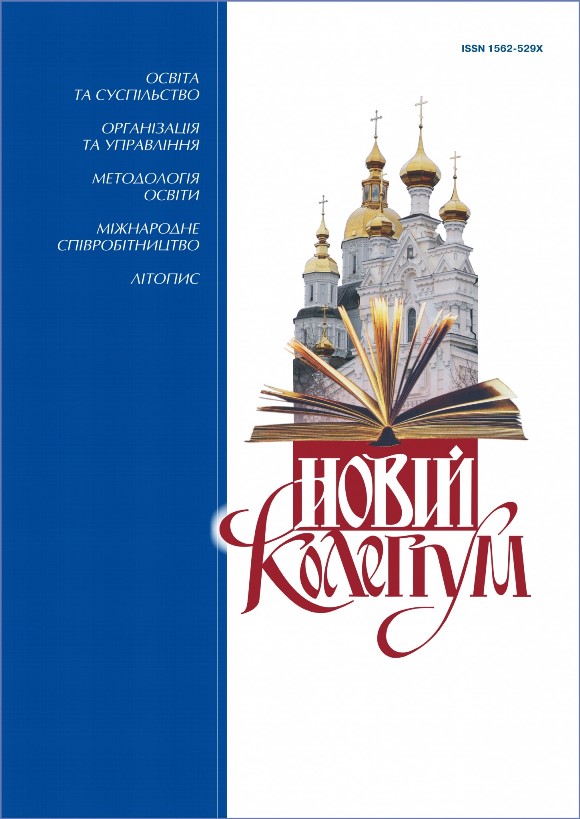Facilitation interaction in distance education of pedagogical universities
DOI:
https://doi.org/10.30837/nc.2020.3.63Keywords:
pedagogical university, teacher, future teachers, facilitation, facilitation interaction, distance educationAbstract
The article is devoted to one of the current problems in pedagogy – the implementation of facilitation interaction in distance education of pedagogical universities. The analysis of the literature showed that Ukrainian professional educational organizations in more than 50% of cases use the educational platform Moodle, which allows to implement individual learning direction of students, create a single user interface for all participants in the learning process, while actively using forums, glossaries, automatic interactive testing, etc., focused on the implementation of optimal facilitation interaction of the subjects of the educational process, taking into account the specifics of the pedagogical university. In the article the essence of the concept of «facilitation interaction» is defined as subject-subject interaction, within which pedagogical support and initiation of various forms of activity of students of pedagogical universities at all stages of the educational process, within which personal formation and development every future teacher as a subject of educational and professional activity. Based on the analysis of scientific papers and taking into account the specifics of the organization of distance education at the Pedagogical University, the main tasks in the implementation of facilitation interaction at a distance are: technical understanding and experience of using online tools by the teacher-facilitator; anticipate and possibly adjust online tools to really make it easier for participants to work interactively and engagingly (during skype / zoom / meet communication). In the course of the research it was proved that the facilitator must master the skills – to create the effect of inclusion and presence here and now, regardless of time zones, cultural differences, sometimes – language, to ensure facilitation interaction in distance education.
References
Вишнівський В. В., Гніденко М. П., Гайдур Г. І., Ільїн О. О. Організація дистанційного навчання. Створення електронних навчальних курсів та електронних тестів. Київ : ДУТ, 2014. 196 с.
Долинський Є.В. Дистанційне навчання – одна з прогресивних форм підготовки фахівців // Теоретичні питання культури, освіти та виховання. 2010. Вип. 42. С. 202–207.
Золотухіна С.Т., Кін О.М., Ткачова Н.О. Теоретичні основи дидактичних досліджень: методичні рекомендації до самостійної роботи з навчальної дисципліни. Харків : ХНПУ імені Г.С.Сковороди, 2019. 26 с.
Концепція розвитку дистанційної освіти в Україні (затверджено Постановою МОН України В.Г. Кременем 20 грудня 2000 р.) [Електронний ресурс]. Режим доступу : http://www.osvita.org.ua/ distance/pravo/00.html.
Прокопенко А. І., Підчасов Є. В., Москаленко В. В., Доценко С. О., Лебедєва В. В. Технології дистанційного навчання: методологія створення та супроводу навчальних курсів : навч. посібник. Харків : ХНПУ імені Г.С.Сковороди ; Мітра, 2019. 81с.
Прокопенко І. А. Обґрунтування системи підготовки майбутніх учителів до фасилітаційної взаємодії з учнями закладів загальної середньої освіти // Теорія та методика навчання та виховання. 2019. № 47. С. 101–112.
DOI: 10.34142/23128046.2019.47.09
Ткачова Н. О. Педагогічний потенціал використання сучасних інформаційних технологій у вищій школі // Психолого-педагогічне забезпечення професійної підготовки фахівців технічного, економічного та гуманітарного профілю : зб. тез за матер. Всеукр. науково-пед. конф. (Херсон, 18 березня 2014 р.). Херсон, ФОП Грінь Д.С., 2014. С. 146–148.
Фісун О. В. Педагогічна фасилітація як багатозначний феномен // Засоби навчальної та науково-дослідної роботи. 2010. №. 34. С. 133–139.
Хупавцева Наталія. Місце фасилітації у структурі пізнавальної діяльності на уроках англійської мови в закладах середньої освіти // Проблеми сучасної психології. Вип. 48. С. 293–312. 2020. DOI: https://doi.org/10.32626/2227-6246.2020-48.
Щебликіна Т. Ткачова Н.О. Шляхи покращення якості підготовки педагогічних кадрів у сучасних університетах // Педагогічна освіта і наука в умовах класичного університету: традиції, проблеми, перспективи. Львів : ЛНУ імені Івана Франка, 2013. С. 69–74.
Callahan M., Wharf B. Distance Education in Social Work in Kanada // Journal of Distance Education. 2000. № 4 (2). Р. 63–80.
Taylor D. Issues, Trends, and Challenges in Distance Education: An International Perspective // Public Administration Undergraduate University of Arizona. 2006. № 53. P. 1–23.
Thurmond V. A., Wambach K., Connors H. R. et al. Evaluation of student satisfaction: Determining the impact of a Web-based environment by controlling for student characteristics // The American Journal of Distance Education. 2002. №16. Р. 169–189.

